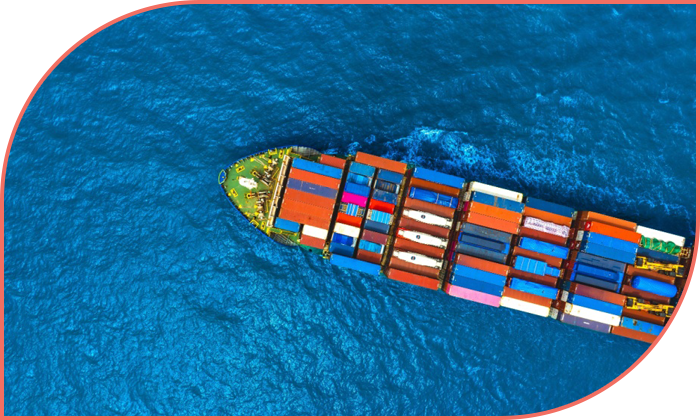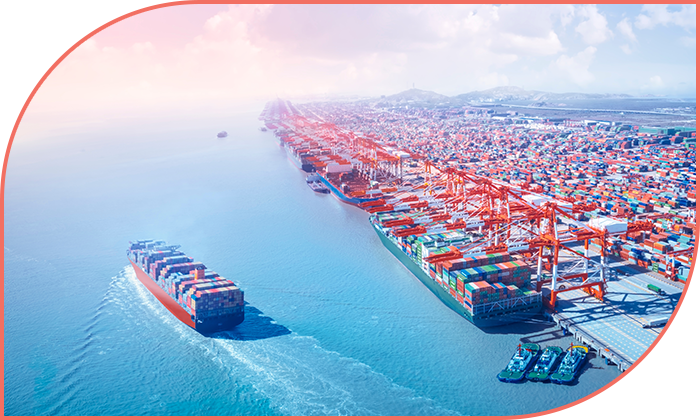Delivered Duty Paid (DDP)
DDP shipping meaning
Delivered Duty Paid (DDP) is a delivery agreement where the seller assumes all the risks and costs associated with delivering the goods to the buyer's location.
These costs can include shipping, export and import duties, insurance, and any other expenses that may arise during the transportation process. Responsibility transfers to the buyer when the goods are delivered to the agreed-upon location.
DDP shipping terms
DDP is vital in international trade because it simplifies the process for buyers, ensuring they receive their goods without worrying about the complexities of customs clearance and additional fees.
Responsibilities of the seller with DDP Incoterm
- Packaging: Ensuring the goods are packaged for transportation in a way that follows industry standards and any other specific requirements agreed upon with the buyer.
- Documentation: Delivered Duty Paid sellers must prepare all necessary documentation, including commercial invoices, packing lists, certificates of origin, and any other documents required for export and import.
- Export clearance: The seller must arrange for export clearance, handling all necessary licences, permits, and customs formalities in the country of origin.
- Transportation: DDP shipping terms state the seller arranges and pays for all transportation costs to deliver the goods to the buyer's specified location. They cover all transportation modes as required, whether by sea, air, road, rail, or a combination.
- Insurance: While not explicitly required under the DDP Incoterm, the seller often arranges insurance to cover the goods during transit to mitigate risks.
- Import Clearance: The seller handles all import formalities in the buyer’s country, including obtaining necessary import licenses and permits. They also pay all import duties, taxes, and any other charges imposed by the destination country’s customs authorities.
- Delivery: DDP shipping terms dictate that sellers must deliver the goods to the agreed-upon location specified by the buyer, which could be the buyer’s premises, a warehouse, or another designated place.
Responsibilities of the buyer with DDP Incoterm
- Providing information: The buyer must provide the seller with the necessary details and specifications for the delivery location, such as any special instructions related to access, unloading, and final placement of the goods.
- Payment: Make payments according to the terms agreed upon in the sales contract. Although DDP includes all costs up to the point of delivery, the buyer must still fulfil any financial obligations as per the purchase agreement.
Compare Freight Shipping Rates in Seconds
Get instant quotes from leading ocean and air freight providers. Find the best rates for your shipping needs in one place.
Benefits of using Delivered Duty Paid
Simplified logistics for the buyer
Under DDP shipping terms, the seller handles nearly all logistics, which significantly reduces the administrative burden on the buyer, who only needs to focus on receiving and unloading the goods.
Predictable costs for importers
With DDP shipping, all costs up to the point of delivery are covered by the seller, including freight, insurance, and import duties. The predictable cost provides importers with a clear, upfront understanding of the total, eliminating unexpected expenses.
Enhanced customer satisfaction
By ensuring a smooth and hassle-free delivery process, a DDP Incoterm can lead to higher levels of customer satisfaction.
Buyers receive their goods delivered to their specified location, fully cleared through customs, and ready for use or resale. This reliability and convenience improve the overall customer experience, fostering trust and long-term relationships between buyers and sellers.

Drawbacks of using Delivered Duty Paid

Increased responsibilities for the seller
Under DDP terms, the seller assumes responsibilities that go beyond those required by most other Incoterms. Serious administrative effort and coordination are expected of the seller, which can increase their workload.
Higher Risk for the Seller
The Delivered Duty Paid seller bears all risks associated with the goods until they are delivered to the buyer’s specified location, including the risk of damage, loss, or delays during transit, as well as complications during import clearance. Should any issues arise, the seller is responsible for resolving them, which can lead to additional costs.
Potential for increased costs
Managing the full spectrum of logistics and compliance requirements can lead to higher operational costs for the seller.
The Best Rate For Your Freight
Access real-time quotes from leading freight providers. Choose the best ocean and air shipping option for your business.
Common mistakes to avoid with DDP Incoterm
Pitfalls in DDP transactions
Inadequate research:
Not researching the buyer’s country’s regulations can lead to compliance issues.
Poor communication:
Lack of communication between seller and buyer can result in misunderstandings and delays with Delivered Duty Paid.
Incomplete documentation:
Missing or incorrect documentation can cause customs delays and fines.
How to mitigate risks
Stay informed:
Regularly update your knowledge of international trade regulations.
Double-check documentation:
Always double-check DDP shipping terms documentation for accuracy.
Choose reliable partners:
Work with reputable logistics and shipping partners.

DDP Frequently Asked Questions
What is the difference between DDP and DDU?
DDP (Delivered Duty Paid) means the seller pays all costs, including duties and taxes, to deliver goods to the buyer's location. DDU (Delivered Duty Unpaid) means the seller is responsible for delivery, but the buyer pays the import duties and taxes.
Can DDP be used for all types of goods?
DDP shipping can be used for most goods, but it may not be suitable for certain high-risk or regulated items where import compliance is complex.
What are the cost implications of choosing DDP?
The DDP Incoterm can be more expensive for the seller, as they cover all costs up to the buyer's location. However, it offers predictable pricing for the buyer.
How does DDP affect delivery times?
DDP can streamline delivery times since the seller manages the entire process, potentially reducing delays associated with customs clearance.
Are DDP Shipping terms suitable for small businesses?
While DDP can simplify international trade for small businesses, the increased responsibilities and costs may be challenging. Small businesses should weigh the benefits against the potential drawbacks of DDP shipping terms.
Get The Best Freight Rates Today
Easily compare rates from top ocean and air freight carriers. Save time and money on your next shipment.rn